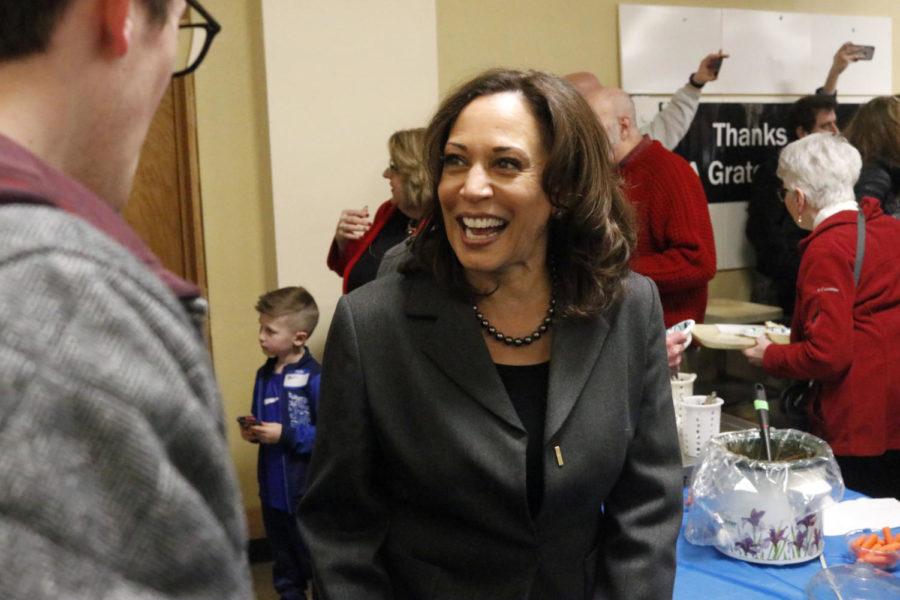Democratic presidential candidates propose reparations
Gillian Holte/Iowa State Daily
Senator Kamala Harris arrives at the Soup Supper. Sen. Harris met with community members before giving a speech. “I think we all know we are at an inflection point in the history of out country, this is a moment in time that is requiring us all collectively and individually to look in a mirror and ask a question and that question is ‘who are we?’,” Sen. Harris said. The Story County Democrats held their annual Soup Supper at the Collegiate United Methodist Church on Feb. 23.
April 19, 2019
With the arrival of the campaign season, Democratic presidential candidates are unveiling their positions, vying for a chance to be the frontrunner for their party. Beginning in February, several politicians started to voice support for measures looking into reparations.
So far, seven candidates have announced their support for some measure of reparations, although not in the same form. In a statement about a bill intended to benefit minorities trying to buy a home, Sen. Elizabeth Warren said black families “have had a much steeper hill to climb and we need systemic, structural changes to address that.”
Sen. Kamala Harris, another candidate, said her policies would not only benefit black people, but that she wanted to benefit Americans as a whole.
“Any policy that will benefit black people will benefit all of society,” Harris said in an interview with NPR.
Other candidates, such as Sen. Bernie Sanders, have turned down the proposal for direct reparations through the form of payment, saying he thinks “there are better ways to do that than just writing out a check.”
Nevertheless, Democratic candidates are starting to act on the idea, and Sen. Cory Booker has introduced a bill to the Senate that would create a commission to explore the idea of racial reparations in the country.
The issue of reparations for slavery has had staunch opposition and support the past several decades. In an article for the The Atlantic, author Ta-Nehisi Coates argued that years of oppression under slavery and Jim Crow laws had left black people in America with long-lasting injustices and disadvantages.
He cited examples of housing discrimination, mistreatment by law enforcement and economic comparisons to white Americans to demonstrate how the issue of racial injustice still exists.
One of the main concepts of Coates’ piece is that America would not experience racial unity until the injustices that he saw dividing races were resolved.
Columnist David Brooks wrote in the New York Times that “The African-American experience is somehow at the core of this fragmentation — the original sin that hardens the heart, separates Americans from one another and serves as model and fuel for other injustices.”
Opponents of the idea of reparations argue that a payment would not solve the problem people are trying to address and that black Americans face. Patrice Onwuka, a senior policy analyst at the Independent Women’s Forum wrote a piece for the Washington Examiner titled, “Black Americans don’t need reparations, we need jobs.”
Onwuka argued that reparations would do little for black Americans, using lottery winners as an example. She said that people who were initially poor and suddenly obtained money often ended up bankrupt despite their boost out of poverty. Instead, she proposed alternative ways to restore prosperity.
“Reparations would deliver a free check or benefit, but they likely won’t set those in struggling black communities on a path to success. A career, however, delivers both income and opportunity for economic mobility” Onwuka said.
Mack Shelley, the director of the political science department, said the issue can be complicated. If reparations were to be implemented in a way that people would receive a check or certain amount of money, the issue of who would be eligible for the benefits and who would have to pay for them would arise at some point.
“I think targeting particular groups and not others is not the best solution,” Shelley said.
Shelley said he believes that a system that applies to all Americans would be better but in the end, he thought that the issue is likely not going to be advantageous for the Democratic Party on a national scale, but that it could be popular among young voters and in the party.
“Is it a matter of getting votes? Well sure, but there doesn’t have to be a single motivation,” Shelley said. “It could be an issue of a guilty conscience.







